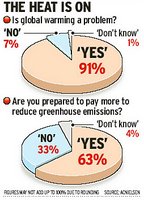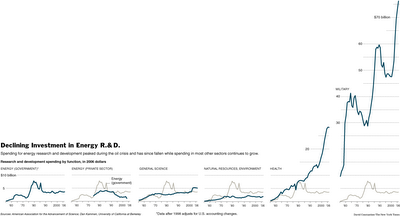Clinton continues: There’s a guy named Matthew Simmons who is a petroleum investment advisor, he’s made a fortune and has been a friend of the Bush family, who believes that we have passed peak oil production. And I don’t know if they're overstating their reserves but I know this, they have said, for example, the Saudis have said they could go up to 12 million barrels a day in production to try to moderate price, and it doesn’t appear to me that they have or can. And keep in mind, most of the OPEC producers prefer oil higher than it was in my second term, but a little lower than this, because they know if it gets real high and stays there, even if we don’t impose gas taxes, America will get in gear and we won’t need as much anymore and the Europeans will do the same and others will do the same. And the Chinese and the Indians might figure out how to skip a step of economic development and not have to use as much energy going through from where they are now to where we are now, in the same… not get there the same way we did.
So I actually believe that most of these oil producers would like it if oil were just a little lower or at least didn’t go to $100 a barrel in five years and everybody I know who knows anything about this business believes it’ll be $100 a barrel in five years or less. Now, the only evidence that we have, those of us who aren’t petroleum geologists, so the question you asked sir, is for example, in the biggest Saudi oil field which has about eight or ten percent of the world’s oil, but has been heavily drilled, they are now getting the more difficult to drill oil out by injecting sea water and filling the… the cavities and then pushing it all back up.
Some of that retrievable oil is now 90 percent sea water, 10 percent oil, which dramatically increases the cost of disaggregating it and implies that there may be less oil there than we thought. We know that the depletion rate of the North Sea oil that the UK has, has accelerated more rapidly then anyone thought. Now the really important question is, what are the implications of this? Let’s say that the world reaches peak oil production, let’s say we haven’t done it yet, but we do sometime in this decade. That would mean that half of all the recoverable oil under planet earth has been sucked out. That’s what it means.
And if that’s true, since the first oil wells for commercial purposes were either in Pennsylvania or in Central Europe, depending on whose account you believe, somewhere in the mid-1800s, would mean most of this oil has come out in the last 60 to 70 years, almost all of it. But at present rates of usage, given the growth of India and China, it would mean we probably have no more then 35 to 50 years of oil left. So the implications are… again I will say, no matter how green you are, almost all conversion technologies rest on an oil platform.
If you look at the resilience for example of the most advanced ethanol production, and they’ve worked on it for years and The Wall Street Journal -- I almost gagged today, did you read that where they were… they were… they said, 'oh it really doesn’t count because they… the governments subsidize it,' as if we didn’t subsidize oil and gas production in America at the same time. But anyway, they have a conversion ratio of about eight to one now, which is stunning, the conversion ratio for corn ethanol is no better than one-and-a-half to one, and that’s outside. So let’s say we could get there, you’ve still got to have the one to make the eight.
So we don’t know how to run an economy without any petroleum. We know we can do what the Germans did in World War II because they had no access to oil, you can take coal and make petroleum out of it, but we also know that unleashes greenhouse gases, so that’s why we have to develop clean coal technology and the Norwegians, for example, are learning to bury it under the North… under the sea. Now we don’t know for sure whether it will stay there and if it stays there, we haven’t gotten any gain. But most scientists who study this believe that we do have quite a lot of cavities in the earth that we could buy coal gas, CO2 under and it would stay there.
But the implications are clear, it means if we don’t change, we’ll either burn up the planet or go broke and they might both happen at the same time and they’ll both happen sometime in the next 100 years in a way that will change civilization irrevocably, that’s the implications. It means we need to get in gear. It means that the biggest threat to our economic future is also, I will say again, a bird’s nest on the ground, for our country and for every rich country.
If you look at the United Kingdom for example, they have an unemployment rate about the same as we do, this is the last factoid I’ll drop on you. The UK has an unemployment rate about the same as ours and they have an economic structure most like America’s, that is they have the most free market system except for the healthcare deal which has the most socialized system, that is most of the doctors still work for the government as well as having the government pay for healthcare although wealthy people can buy outside the system.
Now, the difference is that in the United Kingdom, wages are rising and inequality is declining. I would like to tell you that it’s all because Tony Blair has the same tax policies and social policies I do, did. That may have something to do with it. But the real difference is that unlike America the United Kingdom has found a source of new jobs in this decade. Now, you know where they got it, by meeting their Kyoto targets. Last time I was in London, I did a big deal with Gordon Brown and the papers were full of articles critical of the Blair government because it would not meet its own target of reducing greenhouse gas to 20 percent below 1990 levels.
They then proceeded to say they would reduce them at least 15 percent below 1990 levels, which is 25 percent more then their 12 percent Kyoto target. In other words, we were told, you remember when I came… when our guys came home from Kyoto before I could even present it to the Senate, they voted 95 to nothing against it. They said what a terrible thing I’d done, I was going to… and then… then the Democrats started kind of hedging and coming back to us and… then President Bush said that he would never honor Kyoto because it would bankrupt the American economy.
Look what happened, if -- Gordon Brown has just issued a white paper for the next round of greenhouse gas reductions, and you know what it is? It’s a jobs paper. He says, these are the 20 things we’re going to do and here is how many new jobs will be produced by each of these 20 things. I’m telling you the implications are dire if we don’t do something, but the implications are… it’s like we are being hit over the head with our… our ticket to the future and we’re crazy if we don’t do it.
You go to my Library, we cut the greenhouse gases by 34 percent with 300 and something solar reflectors… glass that keeps the ultra-violet rays out, compact bamboo floors with miles of piping under it that runs hot water in the winter and cold water in the summer and controlled lighting. Every one of those improvements created jobs in the United States of America. If you replaced every light in every home in America, incandescent bulb with a compact fluorescent bulb tomorrow, you would cut the greenhouse gas emissions from lighting by 50 percent.
The lights cost three times as much, they last 10 times as long and within one year, and it’ll take me eight or 10 years to recover our investment, within one year, you would save 25 to 40 percent on your investment because of lower electric bills. This is… and then… and you’d create all these jobs in America making these damn lightbulbs. This is a gift, or a curse, depending on the choice we make. Thank you very much.
 From The World Today last week:
From The World Today last week:



